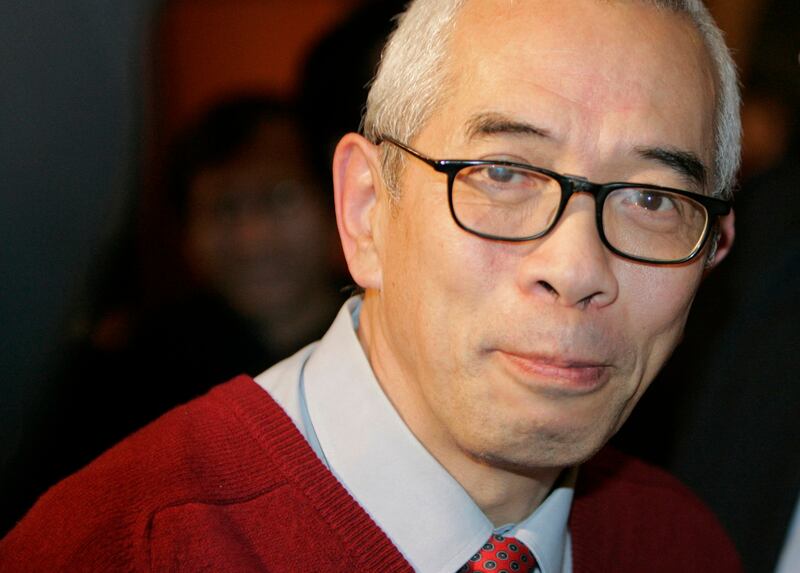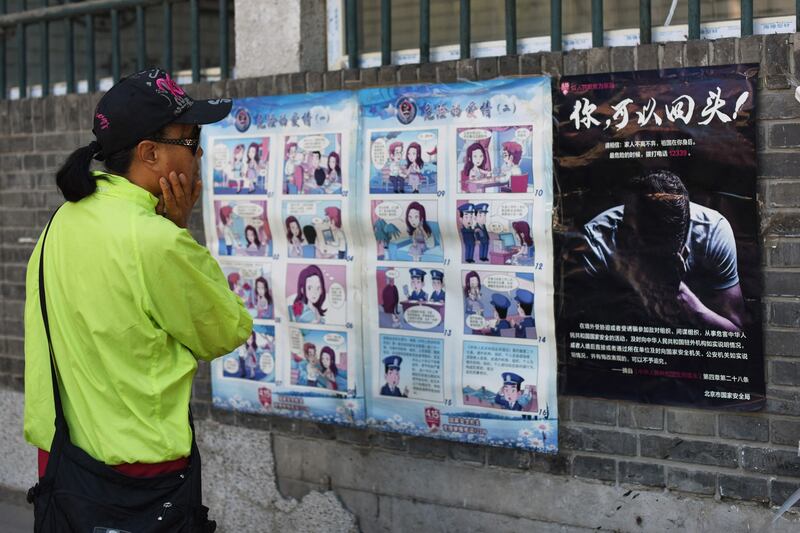China's feared state security police have published a listicle of 10 offenses under the country’s vague Counter-espionage Law that can get you hauled in for questioning, known colloquially as "drinking tea."
They range from the straightforward – anyone engaged in spying or the theft of ill-defined “state secrets” – to owning a miniature camera or video recorder, considered possible "specialist spying equipment.”
In a post titled "10 Cups of Tea" that appeared in the Beijing Daily, the Ministry of State Security listed situations in which members of the public could find themselves under investigation for "endangering national security."
Suspects will be placed under "criminal coercive measures including summons and detention," or "interrogated according to the law," warns the article, which comes amid a campaign for public vigilance for "foreign spies" in daily life.
China last year amended its Counterespionage Law, which expanded the definition of espionage amid raids on foreign consultancy firms, but gave no definition of what constitutes a " state secret."
Police will also want to talk to anyone who "fails to implement '' adequate counter-espionage measures, including around construction projects deemed to have national security implications, and anyone who doesn't cooperate with state security police requests, too.
"Individuals and organizations must respond truthfully and must not refuse" to provide information when asked; anyone who knew about spying activities and didn't report them will also be targeted, the article, signed by the ministry and printed in the Beijing Daily, warns.
Anyone holding or obtaining state secrets without committing the crime of espionage will also be liable for questioning, administrative detention and possible prosecution if they came by them "illegally," the article said.
What is a state secret?
The authorities have previously regarded any official information not officially given to a person or organization as a state secret, including items leaked to journalists.
In 2005, Hong Kong-based Straits Times reporter Ching Cheong was taken away by police in Guangzhou as he went to collect from a middleman the manuscript of a second book about late ousted liberal premier Zhao Ziyang. He was later jailed for five years for espionage.

In 2015, veteran political journalist Gao Yu was handed a seven-year jail term for "leaking state secrets overseas."
Gao was accused of leaking ruling Chinese Communist Party policy Document No. 9, which lists "seven taboos" to be avoided in public debate, including online and in China's schools and universities, including democracy, freedom of the press, judicial independence and criticism of the party's historical record.
She argued that the document had already been published online, and couldn't be regarded as secret, but to no avail.
Anyone who shares anything they know about an investigation deemed to have national security implications could be in hot water with police, too, it says.
"National security agencies may restrict foreigners and foreign institutions from setting up residence or offices in certain areas; those already established may be relocated within a time limit," it warns.
Those who refuse to relocate by the deadline will be subject to forcible eviction and possible administrative detention, it says.
Catch-all charge
The 10th "cup of tea" appears to be a catch-all charge, and involves "acts other than espionage that endanger national security."
Chinese dissident Xiao Yuhui said being "invited to drink tea" is so common these days that a cafe named itself "Police Tea" in honor of the phenomenon.
While state security police typically target dissidents, rights activists and petitioners, actually anyone can be hauled just for posting something online that is picked up by foreign media.
"Last night, lawyers Sui Muqing and Lin Qilei were approached by police in a hotel and asked to cooperate with an investigation, and the lawyers asked for a subpoena," Xiao told RFA. "The police produced one very quickly [because] authority used to be at county level or above, but has now been delegated to police stations themselves."

"They can issue a subpoena at any time and summon anyone they like, including requesting people's cooperation in espionage investigations," he said. "These 10 Cups of Tea means more controls and more suppression of civil society."
Taiwan-based dissident Gong Yujian said most of the "crimes" listed in the article are highly elastic, and can be used for almost anything.
"If the Chinese Communist Party wants to punish you, it can do so at any time, by inviting you for tea, in the name of national security," Gong said.
He said almost any kind of online comment could spark such a decision, if the government wants to suppress it.
"For example, the Ministry of State Security issued a document a while back saying that China's economic security is also a matter of national security," Gong said. "So, talking negatively online about the Chinese economy is a matter of national security."
He said population data and price indices could all potentially be regarded as state secrets, by that rationale.
"There may be 10 red lines drawn here ... if you look at them in detail, there are many more than that, and you never know where the red lines are," he said.
Translated by Luisetta Mudie. Edited by Malcolm Foster.

